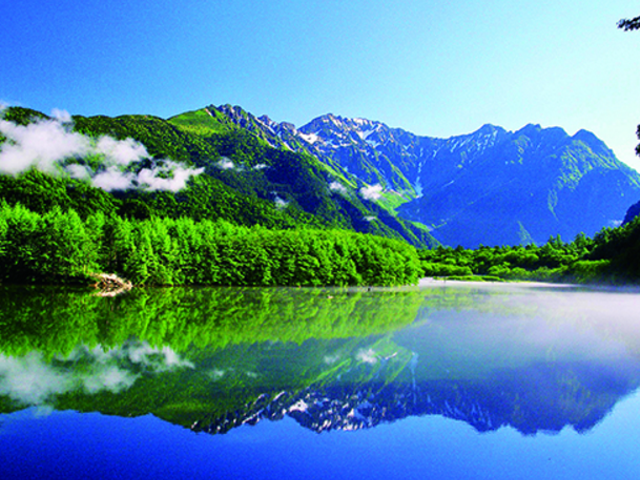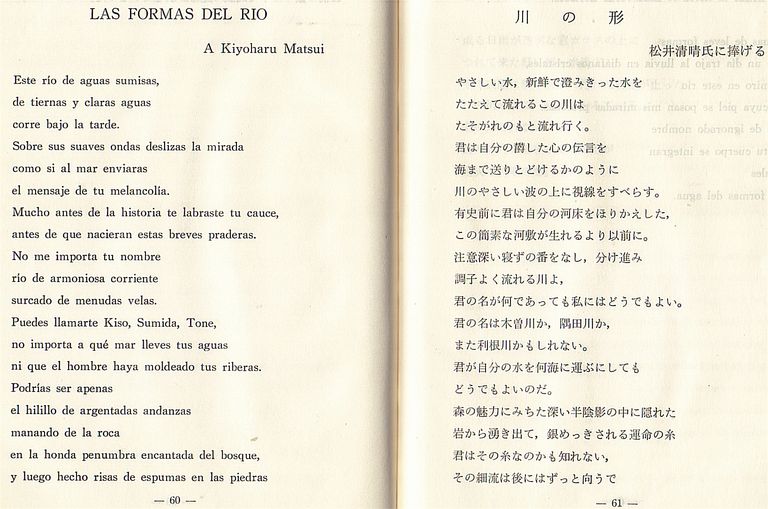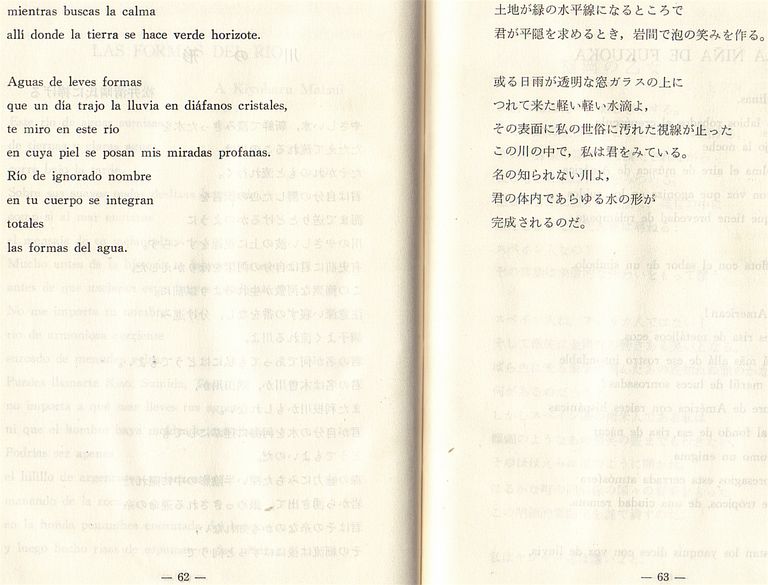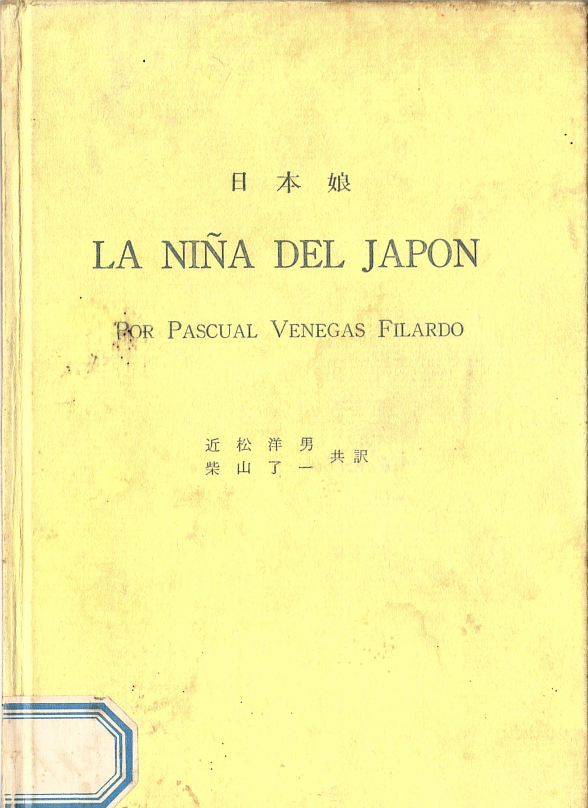I must clarify that the English translation of the poems, originally in Spanish and Japanese, have the terrible weakness that they are simple literal translations, lacking the necessary poetic reworking to adjust the metric, rhyme and cadence that they have in their original languages .
Despite that, the best possible work has been done within my limited capabilities and I hope that publicizing the translation of this work will be of benefit to all.

Fuente
English: |
The shapes of the riverTo Kiyoharu MatsuiThis river of submissive waters, of tender and clear waters runs under the afternoon. On its soft waves you slide your gaze as if to the sea you sent the message of your melancholy. Long before history you carved your channel, before these short meadows were born. I don't care about your name river of harmonious current furrowed with tiny sails. You can call yourself Kiso, Sumida, Tone, no matter what sea you take your waters nor that man has molded your banks. You could be barely the thread of silvery adventures pouring out of the rock in the deep enchanted gloom of the forest, and then made foamy laughs on the stones while looking for calm there where the earth becomes horizon green. Waters of slight shapes that one day brought the rain in diaphanous crystals, I look at you in this river on whose skin my profane glances rest. River of unknown name in your body they integrate totals the shapes of water. |
Spanish: |
Las formas del ríoA Kiyoharu MatsuiEste río de aguas sumisas, de tiernas y claras aguas corre bajo la tarde. Sobre sus suaves ondas deslizas la mirada como si al mar enviaras el mensaje de tu melancolía. Mucho antes de la historia te labraste tu cauce, antes de que nacieran estas breves praderas. No me importa tu nombre río de armoniosa corriente surcado de menudas velas. Puedes llamarte Kiso, Sumida, Tone, no importa a qué mar lleves tus aguas ni que el hombre haya moldeado tus riberas. Podrías ser apenas el hilillo de argentadas andanzas manando de la roca en la honda penumbra encantada del bosque, y luego hecho risas de espumas en las piedras mientras buscas la calma allí donde la tierra se hace verde horizote.[SIC] Aguas de leves formas que un día trajo la lluvia en diáfanos cristales, te miro en este río en cuya piel se posan mis miradas profanas. Río de ignorado nombre en tu cuerpo se integran totales las formas del agua. |
Japanese: |
川 の 形松井清晴氏に捧げるやさしい水,新鮮で澄みきった水を たたえて流れるこの川は たそがれのもと流れ行く。 君は自分の樹した心の伝言を 海まで送りとどけるかのように 川のやさしい波の上に視線をすべらす。 有史前に君は自分の河床をほりかえした, この簡素な河敷が生れるより以前に。 注意深い寝ずの番をなし,分け進み 調子よく流れる川よ, 君の名が何であっても私にはどうでもよい。 君の名は木曾川か,隅田川か, また利根川かもしれない。 君が自分の水を何海に運ぶにしても どうでもよいのだ。 森の魅力にみちた深い半陰影の中に隠れた 岩から湧き出て,銀めっきされる運命の糸 君はその糸なのかも知れない, その細流は後にはずっと向うで 土地が緑の水平線になるところで 君が平隠を求めるとき,岩間で泡の笑みを作る。 或る日雨が透明な窓ガラスの上に つれて来た軽い軽い水滴よ, その表面に私の世俗に汚れた視線が土った この川の中で,私は君をみている。 名の知られない川よ, 君の体内であらゆる水の形が 完成されるのだ。 |
Due to very different circumstances, I found myself with a book that I had saved, it is a somewhat peculiar poetry book in my library, since it is the bilingual edition in Spanish and Japanese of the Venezuelan poet Pascual Venegas Filardo. The work was published for the first time in 1961, but this one I have here is the 1968 edition, published in Kyoto by Gaikokugo Daigaku and consists of 76 pages, bound in hardcover.
The foreword to this book of poems was written by the Venezuelan Ambassador to Japan, J. M. Pérez Morales. In fact, what is most curious to me is that the book I have was from the embassy library ... don't go after me with the excommunication order for stealing books, I really didn't! I think the book was disincorporated or something similar, and then it passed through several hands until it came to me.
I have, to some extent, some affinity with some traits of Eastern cultures, there are several things that I like and in recent times I dusted off a few of them. I thought about checking if the book was available to share, but I only found fragments online, hence the idea of digitizing it and applying OCR to it to share it as it is in print, in both languages. Later on a suggestion from a reader, I decided to translate it into English, even if it is just to give an idea of what the beautiful poems in this book want to express.
Sources:




Mucho más que un navegador. Disfruta de una navegación privada, segura y rápida con Brave